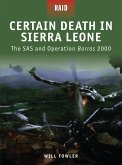Riina Turtio
State-Building and National Militaries in Postcolonial West Africa
Decolonizing the Means of Coercion 1958-1974
Riina Turtio
State-Building and National Militaries in Postcolonial West Africa
Decolonizing the Means of Coercion 1958-1974
- Broschiertes Buch
- Merkliste
- Auf die Merkliste
- Bewerten Bewerten
- Teilen
- Produkt teilen
- Produkterinnerung
- Produkterinnerung
Explores the fundamental role of the military in state-building in francophone postcolonial West Africa and how foreign economic and military aid has influenced it.
Andere Kunden interessierten sich auch für
![German Culture, Politics, and Literature Into the Twenty-First Century German Culture, Politics, and Literature Into the Twenty-First Century]() German Culture, Politics, and Literature Into the Twenty-First Century46,99 €
German Culture, Politics, and Literature Into the Twenty-First Century46,99 €![Certain Death in Sierra Leone Certain Death in Sierra Leone]() Will FowlerCertain Death in Sierra Leone20,99 €
Will FowlerCertain Death in Sierra Leone20,99 €![The Strangest of Places: Building Castles Made of Sand in Afghanistan The Strangest of Places: Building Castles Made of Sand in Afghanistan]() CarozzaThe Strangest of Places: Building Castles Made of Sand in Afghanistan22,99 €
CarozzaThe Strangest of Places: Building Castles Made of Sand in Afghanistan22,99 €![Intervention Narratives Intervention Narratives]() Purnima BoseIntervention Narratives41,99 €
Purnima BoseIntervention Narratives41,99 €![Post-Wall German Cinema and National History Post-Wall German Cinema and National History]() Mary-Elizabeth O'BrienPost-Wall German Cinema and National History52,99 €
Mary-Elizabeth O'BrienPost-Wall German Cinema and National History52,99 €![The Discovery of the Third World The Discovery of the Third World]() Christoph KalterThe Discovery of the Third World55,99 €
Christoph KalterThe Discovery of the Third World55,99 €![Colonialism and the Jews Colonialism and the Jews]() Colonialism and the Jews43,99 €
Colonialism and the Jews43,99 €-
-
-
Explores the fundamental role of the military in state-building in francophone postcolonial West Africa and how foreign economic and military aid has influenced it.
Hinweis: Dieser Artikel kann nur an eine deutsche Lieferadresse ausgeliefert werden.
Hinweis: Dieser Artikel kann nur an eine deutsche Lieferadresse ausgeliefert werden.
Produktdetails
- Produktdetails
- Verlag: Boydell & Brewer
- Seitenzahl: 372
- Erscheinungstermin: 24. Januar 2023
- Englisch
- Abmessung: 234mm x 156mm x 20mm
- Gewicht: 522g
- ISBN-13: 9781847013422
- ISBN-10: 1847013422
- Artikelnr.: 64827268
- Herstellerkennzeichnung
- Libri GmbH
- Europaallee 1
- 36244 Bad Hersfeld
- gpsr@libri.de
- Verlag: Boydell & Brewer
- Seitenzahl: 372
- Erscheinungstermin: 24. Januar 2023
- Englisch
- Abmessung: 234mm x 156mm x 20mm
- Gewicht: 522g
- ISBN-13: 9781847013422
- ISBN-10: 1847013422
- Artikelnr.: 64827268
- Herstellerkennzeichnung
- Libri GmbH
- Europaallee 1
- 36244 Bad Hersfeld
- gpsr@libri.de
Riina Turtio
1. Introduction Peaceful decolonisation and the Cold War Armed Forces and
State Building: The Development of National Militaries in West Africa
Sources and Methodology Objectives and Structure of the book 2. Autonomy:
Foreign Assistance and African Decision-making Pros and Cons of Neutralism:
The Reliance of Guinea and Mali on the Soviet Union Life Insurance: French
Relations with the Presidents of Côte d'Ivoire and Senegal Surviving on
Leftovers: Building National Militaries with Limited Resources French
know-how and strategic minerals: Nigerien defense decisions Conclusion 3.
Sovereignty: Strategies to Control Populations and Territories Coopting
States: Côte d'Ivoire and Senegal Coercive States: Guinea and Mali
Centralized States: Niger and Upper Volta Conclusion 4. Legitimacy and
Colonial Legacies: The Use of Force and Institutions of Coercion Blood Tax:
West African Soldiers in the French Army From 'Mercenaries' to People's
Armed Force: Military Building in Guinea Relying on France: Continuity in
Colonial Structures in Côte d'Ivoire A Reverence for Warriors: The
Postcolonial Importance of Soldiers in Upper Volta Conclusion 5.
Governance: Control and Command of the Armed Forces A Revolutionary Army
Eats Itself: The Soviet Model in Guinea and Mali Economic Liberalism v.
Multiparty Democracy: Ivorian and Senegalese Decision-making Nigerien and
Voltaic Soldiers: Guardians of the Treasury? Conclusion 6. Conclusion:
Legacies of Control
State Building: The Development of National Militaries in West Africa
Sources and Methodology Objectives and Structure of the book 2. Autonomy:
Foreign Assistance and African Decision-making Pros and Cons of Neutralism:
The Reliance of Guinea and Mali on the Soviet Union Life Insurance: French
Relations with the Presidents of Côte d'Ivoire and Senegal Surviving on
Leftovers: Building National Militaries with Limited Resources French
know-how and strategic minerals: Nigerien defense decisions Conclusion 3.
Sovereignty: Strategies to Control Populations and Territories Coopting
States: Côte d'Ivoire and Senegal Coercive States: Guinea and Mali
Centralized States: Niger and Upper Volta Conclusion 4. Legitimacy and
Colonial Legacies: The Use of Force and Institutions of Coercion Blood Tax:
West African Soldiers in the French Army From 'Mercenaries' to People's
Armed Force: Military Building in Guinea Relying on France: Continuity in
Colonial Structures in Côte d'Ivoire A Reverence for Warriors: The
Postcolonial Importance of Soldiers in Upper Volta Conclusion 5.
Governance: Control and Command of the Armed Forces A Revolutionary Army
Eats Itself: The Soviet Model in Guinea and Mali Economic Liberalism v.
Multiparty Democracy: Ivorian and Senegalese Decision-making Nigerien and
Voltaic Soldiers: Guardians of the Treasury? Conclusion 6. Conclusion:
Legacies of Control
1. Introduction Peaceful decolonisation and the Cold War Armed Forces and
State Building: The Development of National Militaries in West Africa
Sources and Methodology Objectives and Structure of the book 2. Autonomy:
Foreign Assistance and African Decision-making Pros and Cons of Neutralism:
The Reliance of Guinea and Mali on the Soviet Union Life Insurance: French
Relations with the Presidents of Côte d'Ivoire and Senegal Surviving on
Leftovers: Building National Militaries with Limited Resources French
know-how and strategic minerals: Nigerien defense decisions Conclusion 3.
Sovereignty: Strategies to Control Populations and Territories Coopting
States: Côte d'Ivoire and Senegal Coercive States: Guinea and Mali
Centralized States: Niger and Upper Volta Conclusion 4. Legitimacy and
Colonial Legacies: The Use of Force and Institutions of Coercion Blood Tax:
West African Soldiers in the French Army From 'Mercenaries' to People's
Armed Force: Military Building in Guinea Relying on France: Continuity in
Colonial Structures in Côte d'Ivoire A Reverence for Warriors: The
Postcolonial Importance of Soldiers in Upper Volta Conclusion 5.
Governance: Control and Command of the Armed Forces A Revolutionary Army
Eats Itself: The Soviet Model in Guinea and Mali Economic Liberalism v.
Multiparty Democracy: Ivorian and Senegalese Decision-making Nigerien and
Voltaic Soldiers: Guardians of the Treasury? Conclusion 6. Conclusion:
Legacies of Control
State Building: The Development of National Militaries in West Africa
Sources and Methodology Objectives and Structure of the book 2. Autonomy:
Foreign Assistance and African Decision-making Pros and Cons of Neutralism:
The Reliance of Guinea and Mali on the Soviet Union Life Insurance: French
Relations with the Presidents of Côte d'Ivoire and Senegal Surviving on
Leftovers: Building National Militaries with Limited Resources French
know-how and strategic minerals: Nigerien defense decisions Conclusion 3.
Sovereignty: Strategies to Control Populations and Territories Coopting
States: Côte d'Ivoire and Senegal Coercive States: Guinea and Mali
Centralized States: Niger and Upper Volta Conclusion 4. Legitimacy and
Colonial Legacies: The Use of Force and Institutions of Coercion Blood Tax:
West African Soldiers in the French Army From 'Mercenaries' to People's
Armed Force: Military Building in Guinea Relying on France: Continuity in
Colonial Structures in Côte d'Ivoire A Reverence for Warriors: The
Postcolonial Importance of Soldiers in Upper Volta Conclusion 5.
Governance: Control and Command of the Armed Forces A Revolutionary Army
Eats Itself: The Soviet Model in Guinea and Mali Economic Liberalism v.
Multiparty Democracy: Ivorian and Senegalese Decision-making Nigerien and
Voltaic Soldiers: Guardians of the Treasury? Conclusion 6. Conclusion:
Legacies of Control








